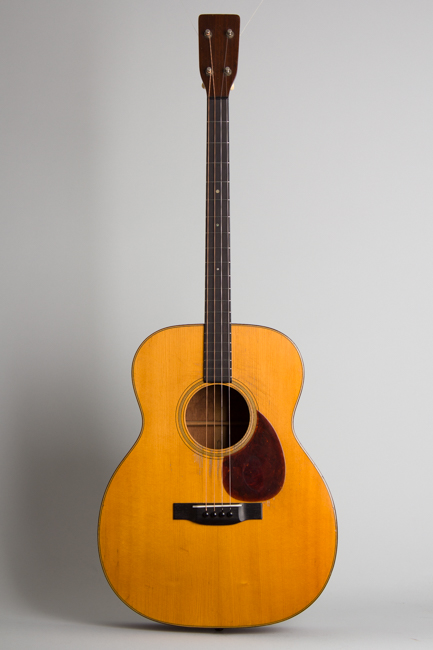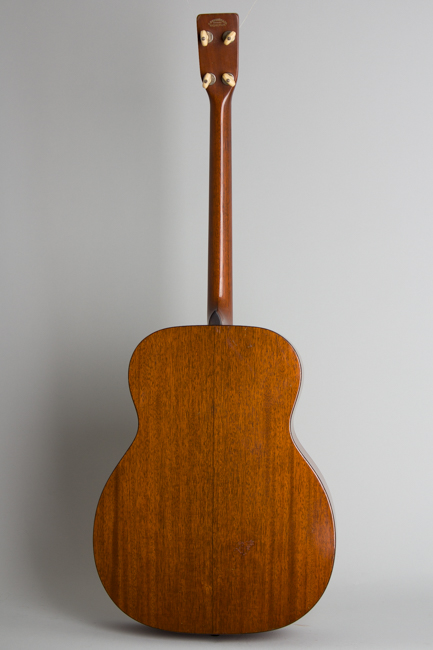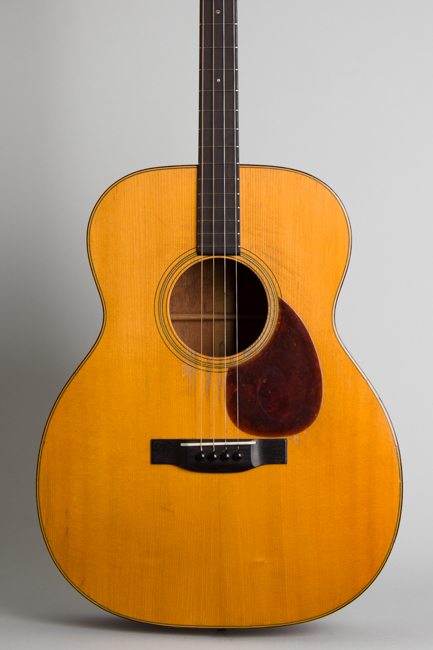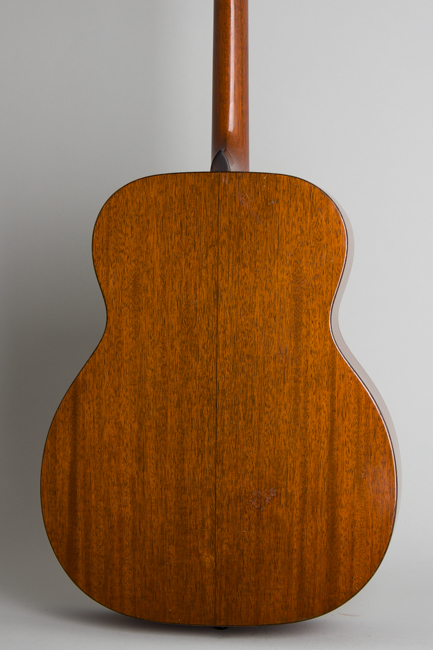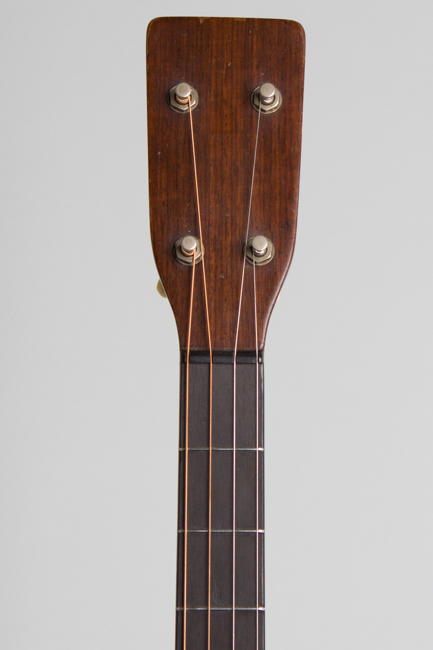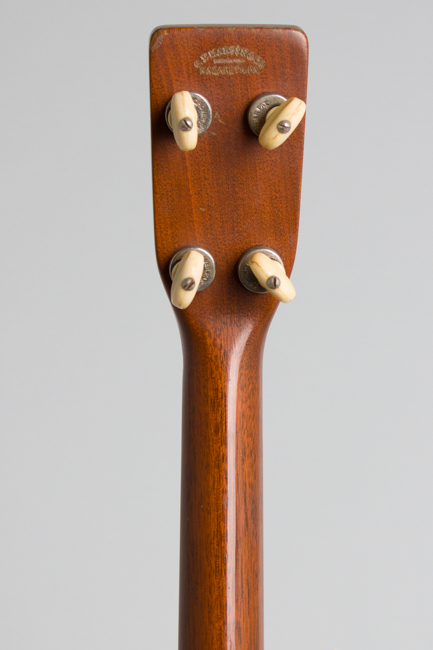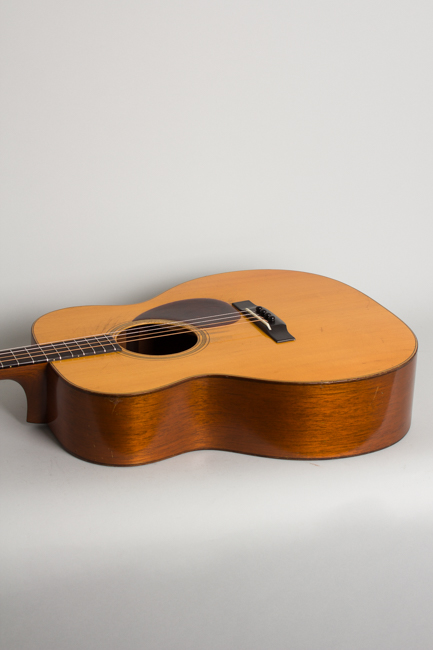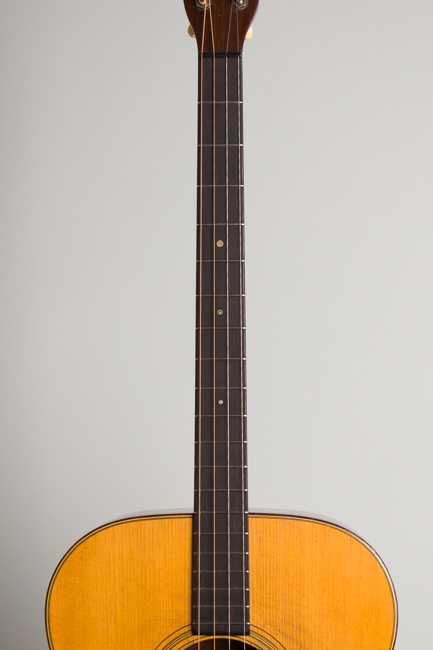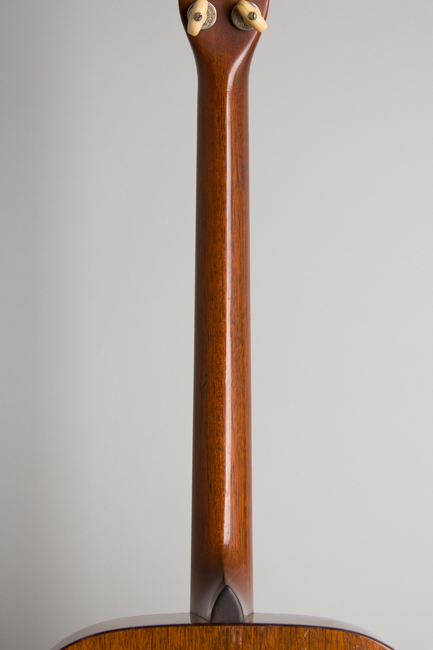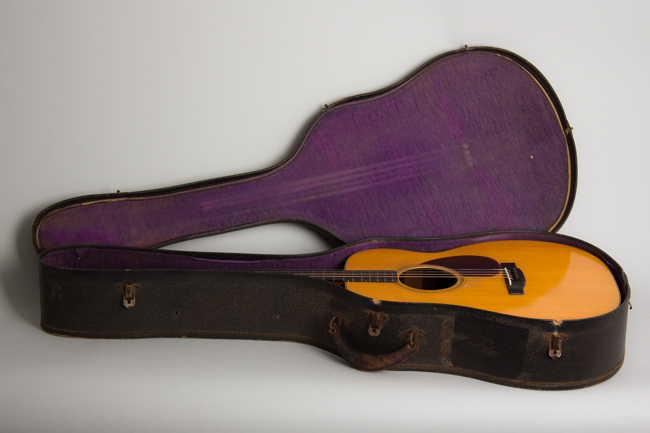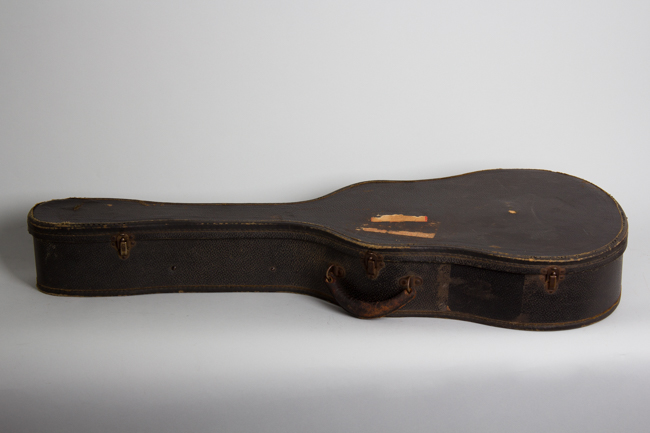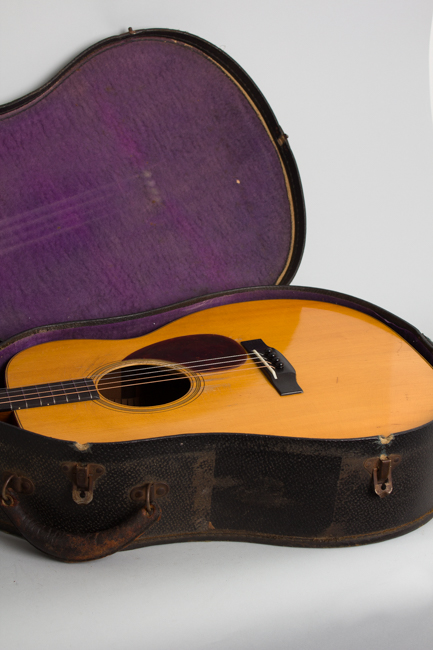C. F. Martin 0-18T Flat Top Tenor Guitar (1931)
This item has been sold.
Item # 9532
Prices subject to change without notice.
C. F. Martin 0-18T Model Flat Top Tenor Guitar (1931), made in Nazareth, PA, serial # 45469, natural lacquer finish, mahogany back,sides and neck, spruce top, ebony fingerboard and bridge, original black chipboard case.
Martin 0-18T tenor guitars from the early 1930's are a wonderful and historically significant instrument, as the now familiar 14-fret body shape was first designed for this particular model. Based on a sketch sent to Nazareth by an employee of Carl Fisher in New York, the new truncated body design was then applied to a six-string 000-28 built for Perry Bechtel as the first OM model. This became the new Martin standard pattern in the early 1930s, effectively replacing the old 12-fret design on nearly all the company's subsequent products.
In the meantime the 0-18T has stood its ground as Martin's most successful tenor instrument virtually from the day it was first sold in 1929. Playing this one it's easy to see why; in fact it is hard to imagine a flat-top tenor guitar much better! We consider this model Martin to be one of the finest 4-string guitars ever made, and this is a wonderful example from the golden era. All of 201 of these tenors shipped out of Nazareth in 1931, a decent number for Martin at the time but many are far more heavily used than this 90+ years later.
Sporting the then-new features of an ebony belly bridge, teardrop tortoise celluloid pickguard and the 14 fret neck, this was a very "modern" instrument for Martin when it was made in early 1931! The body has the standard Style 18 mahogany-and-spruce construction, scallop-braced Appalachian spruce top and contrasting wood top trim. The rosewood-faced headstock has no Martin logo on the front (that would be added shortly) and "no-tab" Grover pancake tuners. The fingerboard and nut are ebony with bar frets and mixed-size dot inlay at frets 5, 7, and 10.
While designed in the late 1920's for tenor banjoists getting pushed out of work by the preference for the guitar's mellower tone, tenor guitars have a range of possibilities still not fully explored. This one has a sweet but powerful sound that can get quite loud when pushed. In the 1930s and '40s Rabon Delmore used small tenor Martin models including an 0-18T to play the deftly picked leads that characterize the Delmore Brothers' music; this is one "Ol' Guitar" it's hard to "Lay Down"!
Overall length is 35 1/2 in. (90.2 cm.), 13 1/2 in. (34.3 cm.) wide at lower bout, and 4 1/16 in. (10.3 cm.) in depth at side, taken at the end block. Scale length is 23 in. (584 mm.). Width of nut is 1 3/16 in. (30 mm.).
This guitar shows some use but is an excellent player and far less worn than many pre-WWII Martins. The top lacquer shows very light checking only really visible at an angle. The original finish remains very well preserved for 90+ years on Earth, showing dings, nicks and scratches over the body. The most noticeable is an isolated spot on the back, near the center of the lower bout, where the finish has worn through completely. There is pick wear around the fingerboard extension, soundhole ring and pickguard going into the wood in places, and a small wear spot on the surface of the pickguard itself.
On the treble side of the guitar at the curve of the lower bout there is evidence of a small side crack repair that was neatly sealed and finished over, cleanly if slightly textured to the touch. There is a hairline crack on the back near the lower bout that has been neatly sealed, and is nearly invisible to the naked eye. This is the only added finish on the instrument.
This 0-18T has had some other repairs common for Martins of this era. The neck has been neatly reset, with light fret work which included leveling and re-crowning the original bar frets. A new bone saddle has been fitted to the original belly bridge. That original ebony bridge and the small maple bridgeplate remain untouched. Two cleats are located below the bridge, running along the center seam as a re-inforcement although it never opened up.
This 0-18T plays and sounds great, with a comfortable feel up and down the neck. The original Grover banjo tuners are very sturdy and stay in tune even after so many decades. The original chipboard case is included, a bit worn but really very well preserved for also being over 90 years old! Excellent Condition.
Martin 0-18T tenor guitars from the early 1930's are a wonderful and historically significant instrument, as the now familiar 14-fret body shape was first designed for this particular model. Based on a sketch sent to Nazareth by an employee of Carl Fisher in New York, the new truncated body design was then applied to a six-string 000-28 built for Perry Bechtel as the first OM model. This became the new Martin standard pattern in the early 1930s, effectively replacing the old 12-fret design on nearly all the company's subsequent products.
In the meantime the 0-18T has stood its ground as Martin's most successful tenor instrument virtually from the day it was first sold in 1929. Playing this one it's easy to see why; in fact it is hard to imagine a flat-top tenor guitar much better! We consider this model Martin to be one of the finest 4-string guitars ever made, and this is a wonderful example from the golden era. All of 201 of these tenors shipped out of Nazareth in 1931, a decent number for Martin at the time but many are far more heavily used than this 90+ years later.
Sporting the then-new features of an ebony belly bridge, teardrop tortoise celluloid pickguard and the 14 fret neck, this was a very "modern" instrument for Martin when it was made in early 1931! The body has the standard Style 18 mahogany-and-spruce construction, scallop-braced Appalachian spruce top and contrasting wood top trim. The rosewood-faced headstock has no Martin logo on the front (that would be added shortly) and "no-tab" Grover pancake tuners. The fingerboard and nut are ebony with bar frets and mixed-size dot inlay at frets 5, 7, and 10.
While designed in the late 1920's for tenor banjoists getting pushed out of work by the preference for the guitar's mellower tone, tenor guitars have a range of possibilities still not fully explored. This one has a sweet but powerful sound that can get quite loud when pushed. In the 1930s and '40s Rabon Delmore used small tenor Martin models including an 0-18T to play the deftly picked leads that characterize the Delmore Brothers' music; this is one "Ol' Guitar" it's hard to "Lay Down"!
Overall length is 35 1/2 in. (90.2 cm.), 13 1/2 in. (34.3 cm.) wide at lower bout, and 4 1/16 in. (10.3 cm.) in depth at side, taken at the end block. Scale length is 23 in. (584 mm.). Width of nut is 1 3/16 in. (30 mm.).
This guitar shows some use but is an excellent player and far less worn than many pre-WWII Martins. The top lacquer shows very light checking only really visible at an angle. The original finish remains very well preserved for 90+ years on Earth, showing dings, nicks and scratches over the body. The most noticeable is an isolated spot on the back, near the center of the lower bout, where the finish has worn through completely. There is pick wear around the fingerboard extension, soundhole ring and pickguard going into the wood in places, and a small wear spot on the surface of the pickguard itself.
On the treble side of the guitar at the curve of the lower bout there is evidence of a small side crack repair that was neatly sealed and finished over, cleanly if slightly textured to the touch. There is a hairline crack on the back near the lower bout that has been neatly sealed, and is nearly invisible to the naked eye. This is the only added finish on the instrument.
This 0-18T has had some other repairs common for Martins of this era. The neck has been neatly reset, with light fret work which included leveling and re-crowning the original bar frets. A new bone saddle has been fitted to the original belly bridge. That original ebony bridge and the small maple bridgeplate remain untouched. Two cleats are located below the bridge, running along the center seam as a re-inforcement although it never opened up.
This 0-18T plays and sounds great, with a comfortable feel up and down the neck. The original Grover banjo tuners are very sturdy and stay in tune even after so many decades. The original chipboard case is included, a bit worn but really very well preserved for also being over 90 years old! Excellent Condition.
